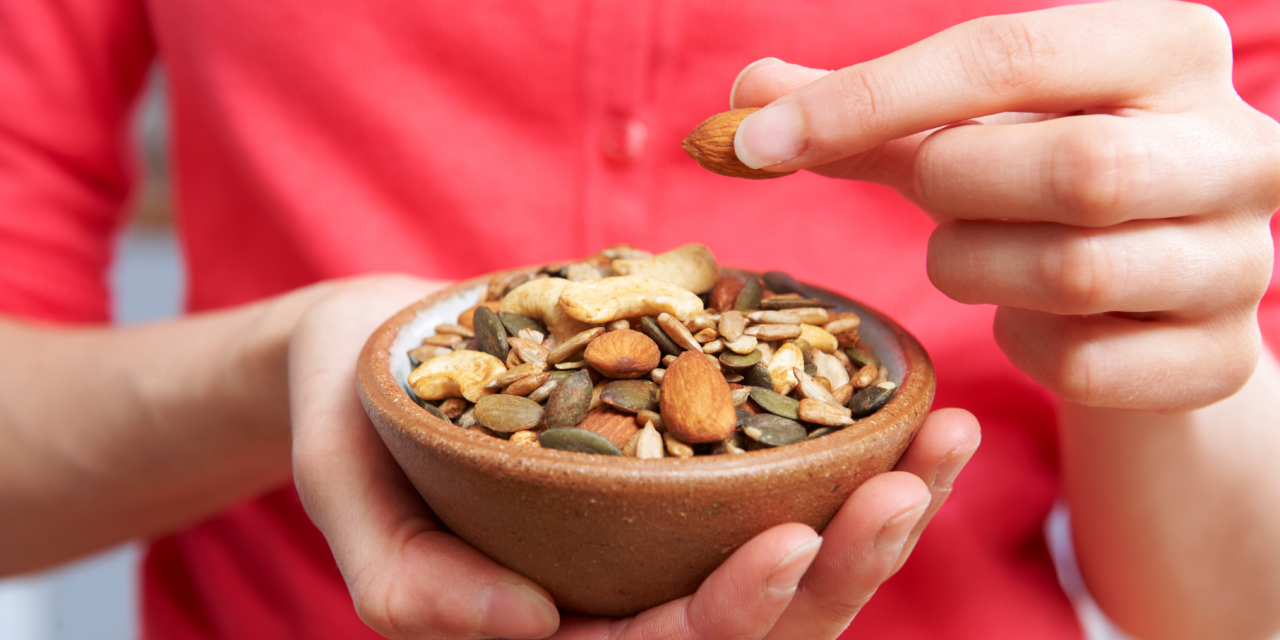By Sara Jank, MS, RD, CDN
Nuts and seeds have been an important part of the human diet for hundreds of thousands of years. They pack a nutritious punch in a small, versatile package! Eating a handful of nuts or seeds most days is recommended as part of an overall plant-focused diet that may reduce your risk of developing many chronic diseases, including cancer and heart disease. Try them raw, toasted or ground, eaten on their own, or tossed into sweet or savory recipes.
Nuts are usually divided into two categories: peanuts (which are seeds in the legume category), and tree nuts (which are the seeds of trees). Tree nuts include walnuts, pecans, cashews, pistachios, hazelnuts, almonds, and Brazil nuts. Some of these, such as walnuts and cashews, contain a fruit inside, while others, such as hazelnuts and chestnuts, are the fruit. However, actual seeds come from vegetables, such as pumpkins, and flowers, such as sunflowers, flax, or other crops.
Nuts and seeds provide protein, dietary fiber, and polyunsaturated and heart-healthy monounsaturated fats. One type of polyunsaturated fat called alpha-linolenic acid (ALA) is a heart-healthy omega-3 fatty acid found in walnuts, chia seeds, and ground flax seeds. Different nuts and seeds also contain a variety of vitamins and minerals, such as vitamin E and magnesium.
Studies have shown that eating one ounce of peanuts, certain tree nuts (walnuts, almonds, pistachios), and/or seeds most days may help reduce the risk of certain cancers, including colorectal, endometrial, and pancreatic cancer. They may also reduce the risk of heart disease, stroke, and cardiovascular disease. Some of the benefits revealed in these studies are linked specifically to eating nuts and seeds. Benefits were also found in eating nuts and seeds in combination with a healthy lifestyle that includes more physical activity and an overall healthy eating pattern. Eating more than an ounce (about ¼ cup) each day was not shown to be a benefit because of the increase in consumption of calories.
Some nuts and seeds are being studied for their potential to prevent certain cancers. For example, because of its omega-3 fats and phytochemicals, researchers are investigating whether flaxseed can protect against breast cancer, while compounds in walnuts are being evaluated for their potential role in protecting against cell damage and cancer cell and tumor growth. However, no single compound or specific type of food will prevent cancer, so it’s best to eat a variety of nuts and seeds.
Store nuts and seeds in a cool, dark place and refrigerate or freeze them to prevent them from become rancid due to their fat content. You can roast or lightly toast nuts and seeds to enhance their flavor. Use them as additions to main dishes, sauces, or soups; or as a dessert topping. Find great tips and recipes for seeds and nuts at the American Institute for Cancer Research at www.aicr.org.
Sara Jank, MS, RD, CDN is a clinical dietitian at Roswell Park Comprehensive Cancer Center. For more great articles, visit https://www.roswellpark.org/cancertalk.












